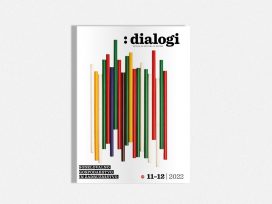Homo homini Rom
The news from the Dolenjska region, more specifically from the environs of Ambrus, no longer surprises us. In the days following the incident in Goga, an assault which was followed by the people’s judgment that the Roma were to blame for everything, the mass media devoted much attention to its interpretation, some of it even critical. Civil society responded, though not terribly convincingly. On the Tuesday evening before November 1, the Day of the Dead, only a handful of people turned out in the cold for a demonstration of solidarity with the Roma, held in front of the National Assembly. The building was empty. The majority of the state nomenclature were not far away, sitting in the cultural cellar of Slovenehood in celebration of Reformation Day, and most of all fixing their eyes upon the first public appearance of Slovenia’s First Lady.
Events in the place which is also home to a Roma population have these days escalated to the point where the national government of Slovenia was forced to intervene. As a result, people were given the impression that the state arrived on the scene as the principal liberator, bringing peace to the inter-ethnic conflicts in the Dolenjska region; in reality, by deporting Slovene citizens (!) to the Centre for Refugees and Aliens in the town of Postojna, the Slovene state flunked an important test on the rule of law, respect for human rights, and many other areas. Just as the inhabitants of Ambrus blame the Roma – and not, for example, the dysfunctional state – for water pollution, landscape blight, compromised security, and the driving of unregistered vehicles, so the state tried to redirect attention by scapegoating the office of the human rights ombudsman, which informed European institutions of the irregularities in the state procedures, and thereby became an enemy of the state. It also blamed other civil society initiatives and actors that publicly drew attention to the blunders made in trying to resolve the situation.
The Dolenjska incident can thus become a Slovene precedent for the way a local population responds to unresolved problems in its immediate environment. The danger of a snowball effect, which would encourage people to take the law into their own hands when the national and municipal institutions fail to act adequately at the local level, should not be overlooked. However, the reaction of the state to this very same incident is practically a textbook case of a process leading to the ethnicization of the country. The sociological sciences use this term to characterize actions and processes that grant access to power only to those who belong to the ethnic majority: political power is concentrated in the hands of the ethnic majority and used exclusively to advance that majority’s interests; material goods, symbols, and rituals of the state are used to the advantage of the ethnic majority community, and the cultural reproduction of the majority is the most important concern of the state, even as the state apparatus abandons the ethnic minority at the margins of society, politically and economically as well as socially and culturally.
But let there be no mistake: ethnicity in and of itself is a priori undemocratic and destructive of parliamentary democracy and the rule of law. This happens when the state, civil society, or both, are too weak to govern, and when ethnic criteria become the deciding factors in state and civil decision-making processes. At that point, ethnicization of the state, i.e. the alliance of the state and ethnicity against civil society, leads to the execution of powers based on ethnic criteria and potentially to nationalist conflicts. For this reason, mutual dependence is necessary, and the correction of the state, civil society, and ethnicity, especially – and usually this is the case – if the country is multi-ethnic. In contrast, the weakness of the state and civil society weakens the independence and sovereignty of the state’s organization in the eyes of its citizens and at the same time strengthens the ethnicization of political decisions and political actions. It could be said that it is necessary to establish and maintain a synergistic operation of the state, civil society, ethnicity, and, not least, the international environment. The ethnicization of the individual’s existence and, along with this, that of the state is to a certain extent necessary since it helps to ensure the cohesiveness without which a modern national state could hardly exist. Individuals can of course identify with the state through its institutions, but these are rarely sufficient. And when these institutions fail, people find recourse in ethnic identity and blame problems on ethnic differences, or on groups which are different from “us”, and fall back on a common approach to solving the problems and sometimes also a rationalization either through verbal or physical violence against members of another ethnic community.
We should not be under the illusion that a national state as a form of political organization is based on a rational citizenship principle, and that it is free of ethnic identification. This was the most frequent argument of the international and especially European public during the events at the time of the Yugoslav wars in the 1990s. But case studies show that of course western Europe is also not immune to the question of ethnic differences. Despite the Enlightenment tradition of rationalism, the feeling of sharing a common culture as the foundation of ethnicity has been present in the original nationalisms of even the most citizen-based systems in Europe: French, English, or Dutch. For this reason, the dichotomy between civil and ethnic identity can be more appropriately understood as a spectrum or continuum, which means that there are citizenship systems of “open ethnicization”, in which it is necessary to avoid situations in which citizenship systems are incapable of realizing the principles of democracy and law for all their citizens without respect to ethnic identity. At that time, the social, economic, and cultural differences between two or more groups quickly become the basis for discrimination. Some authors label this with the term ethnicism, since it is not explicit discrimination on the basis of physiological or physical characteristics of a social group. But as the Dutch communicologist Teun A. van Dijk puts it, ethnicism is just a “milder” form of modern racism, usually not restricted to small extremist groups but a common practice at the institutional level of modern societies as well. The search for substitute expressions is actually just an avoidance of problematizing the existence of racism in modern European countries based on the principle that if something is not named, then it doesn’t exist as a problem. At least until such time as we ourselves become the Roma.
Published 16 December 2006
Original in Slovenian
First published by Dialogi 11-12/2006 (Slovenian version)
Contributed by Dialogi © Ksenija Sabec/Dialogi Eurozine
PDF/PRINTNewsletter
Subscribe to know what’s worth thinking about.



